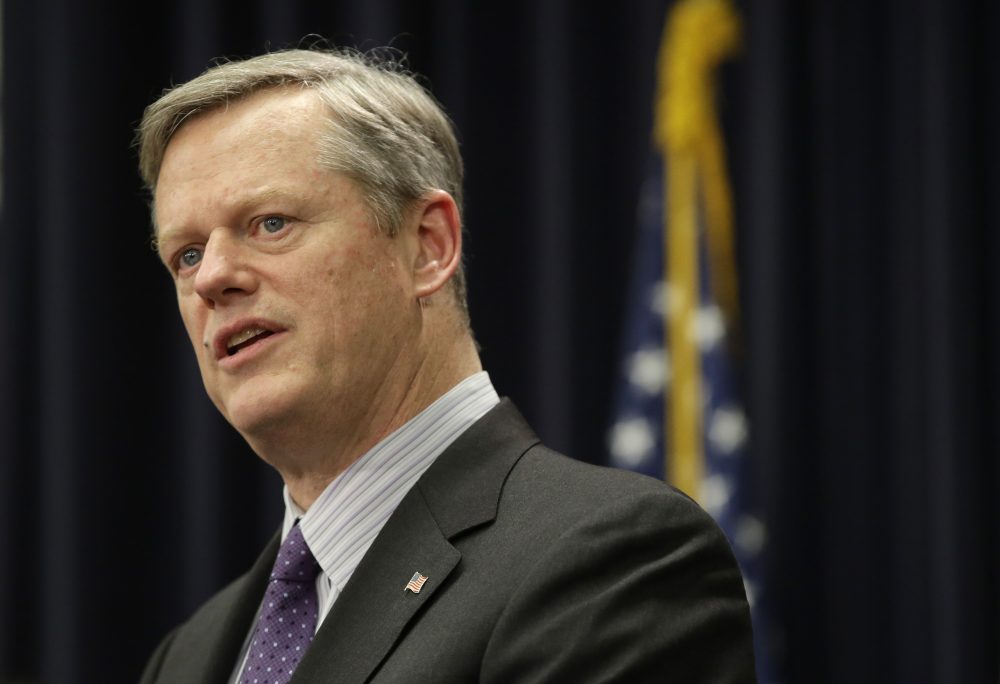Advertisement
As New Fiscal Year Arrives, Mass. Lawmakers Grapple With Shortfall

A conference committee of six lawmakers has been laboring behind closed doors for several weeks to address a tax revenue shortfall that has thrown in doubt the assumptions on which the state's $40.3 billion budget is based.
The state's new fiscal year began Saturday but the budget impasse won't cause any immediate problems. The Democratic-controlled Legislature has approved a stopgap $5.2 billion budget to keep state government operating for several weeks if necessary, though legislative leaders are hoping to have a plan in place well before that.
A closer look at the revenue gap, what's causing it and what might be done to fix it:
How big is the hole?
As yet, there is no clear answer, but what seems clear is the shaky math underlying the state's fiscal situation.
According to the latest estimates from Republican Gov. Charlie Baker's administration, the revenue shortfall for fiscal 2017, which ended on Friday, is around $430 million.
Important to note is that spending levels in the proposed fiscal 2018 budget are based on a projected 3.9 percent increase in revenues over what had been anticipated for fiscal 2017, not what the state has actually taken in. So, that leaves the 2018 budget out of balance before a single penny has been spent.
But that's only part of the problem. Tax revenues have risen only about 1.2 percent during the previous 12 months, making the 3.9 percent increase forecast for the next 12 months, "very optimistic and I would say unrealistic," said Eileen McAnneny, president of the Massachusetts Taxpayers Foundation.
Why the revenue crunch?
A variety of explanations have been offered, from volatility in capital gains payments resulting from stock market fluctuations, to diminished sales tax revenues as more consumers make tax-free online purchases.
Economists writing for MassBenchmarks, a journal of the state's economy, noted this past week that despite continued jobs gains and low unemployment, wage growth in Massachusetts has been "anemic" of late.
Stagnant wages mean "increasing financial challenges for Massachusetts households, disappointing state tax receipts and a slowing state economy," the economists warned.
What's being done?
It seems inevitable that revenue estimates for the new fiscal year will be revised downward, but no one is saying by how much.
"There is a realization that there may have to be some kind of adjustment," Democratic House Speaker Robert DeLeo told reporters earlier in the week.
Since the budget negotiations are shrouded in secrecy, there's no way of knowing if revisions have been made. And Baker has so far not filed a revised budget request with the Legislature to reflect lower revenue estimates, even though state law appears to call for that.
Will there be spending cuts?
Without any significant tax increases on the near horizon, state officials will almost certainly have to trim spending in the new budget. But there aren't a lot of big pots of money waiting around to be cut.
A large portion of state spending is non-discretionary - Medicaid, for example, which consumes about 40 percent of the total annual budget. State lawmakers would be loath to cut into many other areas, such as state aid to public school districts, support for the state's child welfare agency or spending on addiction treatment.
Meanwhile, Baker says his administration has been, in his words, "nipping and tucking" for several months to address the 2017 budget shortfall, but he's offered few specific details.
Can money be taken from the rainy day fund?
It would appear to be off limits, at least for now. Standard & Poor recently brought Massachusetts' bond rating down a notch, citing concerns the state hadn't done enough to replenish its reserve account after drawing it down to pay for operating costs in past years.
"We can't be dipping into the rainy day fund," said McAnneny. "That's not an option."
Are revenue problems unique to Massachusetts?
Not at all. A recent survey by the National Association of State Budget Officers found that revenue collections in 33 of 50 states fell below projections in fiscal 2017. Not surprisingly, purse strings have tightened around the nation, with U.S. governors on average proposing only a 1 percent increase in total spending in their fiscal 2018 budget requests, according to the survey.